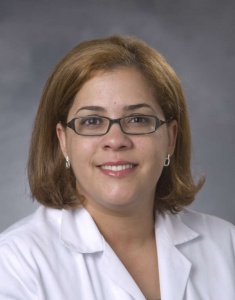Leonor Corsino, MD, MHS, assistant professor of medicine (Endocrinology, Metabolism and Nutrition), is the leader for the Department of Medicine Latino Initiative.
“This initiative aims to increase the presence of Latinos at all levels in the Department,” she said. “This year we had a very successful match with a total of three categorical Latino residents and one preliminary resident. We are so excited to welcome them to our Duke family!”
Q: Why is it important to increase the number of Latinos in medicine?
medicine?
A: The Latino population represents 17% of the total U.S. population and we are expected to increase to 30% by the year 2050. However, only 4.9 % of physicians in this country are Hispanic/Latino. Further, the Hispanic/Latino population is disproportionally affected by obesity and type 2 diabetes. Increasing the number of racial and ethnic minority healthcare professionals is one way to confront this challenge.
Q: Does that mean that only underrepresented physicians can address healthcare disparities?
A: No. This not an issue to be solved only by underrepresented minorities. We are all called to work towards improving the health of all. As providers, we enter medicine to help our patients achieve health and wellbeing and if we are not achieving that for all of our patients we all need to take steps to address that. If we don’t do anything about it, we are failing our patients and our profession.
Q: You have a NIH diversity supplement—tell us about that program and your experience with it.
A: It aims to increase the diversity of the research workforce by supporting individuals from underrepresented racial and ethnic backgrounds. It’s important because underrepresented minorities are among the groups with the highest attrition rate when it comes to research careers. My project is a supplement to Dr. Kelli Allen’s R01 looking at a patient and provider intervention for the management of osteoarthritis in primary care. I conducted a pilot of this intervention in a small group of Spanish-speaking Latinos. The project will be completed by the end of the month and we should be able to get results in the next couple of months.
Q: What research will your 2015 Chair’s Research Award support?
A: My new line of research will focus on determining biological factors contributing to different responses to bariatric surgery. We know that obesity and type 2 diabetes are a major burden for minorities in this country and during the last couple of decades bariatric surgery has emerged as effective long term option for weight management. However, current evidence suggests that some patients do not achieve the expected amount of weight loss, especially African Americans. I aim to identify if hyperinsulinism is a potential biological factor contributing to the differential response to surgery.
Q: What are your long term research goals?
A: My goal is to become a leader in the field of obesity, diabetes, and health disparities and to increase our understating of the contribution of biological factors to disparities. I would like to be able develop new therapeutic interventions that will allow us to close the gaps.